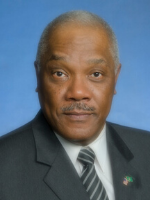
Ron Martin runs The Consultancy Coalition, a security consultancy based in Shreveport, Louisiana, and is a big believer in the power of associations and the benefits of mentoring. After serving in the US Army Military Police in Vietnam, he returned to civilian life to attend college and work as a police officer in Virginia. He then went back into the Army, where he was taken under the wing of superior officers who encouraged him to join ASIS International and obtain his Certified Protection Professional certification. Read more to hear how he’s been paying it forward ever since and helping mentor the next generation of security professionals.
How did your time in the Army help jump-start your security career?
In 1983, a colonel said, ‘You need to join ASIS and I’m going to sponsor you.’ I didn’t know what ASIS was, but I said, ‘OK.’ Then he said, ‘You’re also going to be a CPP.’ So I got my CPP. And two other colonels, Tom Roberts and Rich Yamamoto (who went on to become both the CSO of the Department of Commerce and Fannie Mae), also looked after me. Rich got me involved in Homeland Security Presidential Directive 12 to give input to the smart card standard being written by NIST. These guys put me in the position to excel. I’ve had all of these people put capital in me over the years. They all said don’t forget the people who come up behind you.
I saw you in action last year at the conference of the International Organization of Black Security Executives (IOBSE), working with students who might not have contemplated a career in security. Tell us about that.
IOBSE was founded in 1985 or 1986. The founders were frustrated with ASIS because in order to join back then, a member had to recommend you and the chapter had to vote you in. For the most part, women and people of color didn’t know anyone. IOBSE was established to introduce people of color to career opportunities in security, a lot of which are not obvious.
How did the student conferences come about?
About 12 years ago, someone got their corporate headquarters to fund students for a week with IOBSE. We have two days of conferences, plus sessions for them on dressing for success, interacting with security professionals, and interviewing. We also give a $1,000 scholarship to four students. Last year the CSO of Microsoft, Brian Tuskan, attended. One young student really wanted to intern for Microsoft, and she got up the courage and gave her elevator pitch to him. She got an internship on the spot. Another young lady was more interested in political science than security, and I knew that Don Erickson, the CEO of the Security Industry Association, was there. Don used to work on the Hill, so I brought the two together. She gave her pitch and he offered her a potential internship. Just in those two cases we exposed students to unique opportunities.
How many of these students end up practicing security?
Some do. I had a young lawyer decide to go into crisis management law because of that conference. Something that was said there helped him make up his mind. What I do is I make sure students get a one-year membership to ASIS. A couple have really taken advantage of it. One is a manager for a major account at AlliedUniversal, doing very well.
That membership meant shelling money out of your own pocket, right?
Yeah, but I have a nonprofit for that, and every now and then someone contributes. I’m very blessed. I like to give back. I generally sponsor 40-45 students a year into ASIS. At conferences I tell people if I can do that, you can get at least one. I also sponsor students from Nigeria and other countries where $20 is a lot of money.
And how do you put those students on a path to a security career?
I have a student collegiate affiliate program through my nonprofit where I tell them about the security industry and the U.S. Department of Labor competency model for security careers that Apollo, ASIS, and the University of Phoenix put together. Then I talk about selecting a career field. I have the students go to the DOL occupational handbook and select a career and find out how to get into that field. After that, they can put together their resume based on the handbook description.
You’re continuing to be a role model. Not only by establishing a new college security curriculum but even pursuing a PhD yourself. Why do that?
I don’t need it. I’m retired. But I have a granddaughter that has a double masters from the University of Maryland. I kept encouraging her to get a PhD, and she said, “Well you don’t have one.” And then her cousin went and got a masters and I told her she had to get a doctorate, and she said the same thing my other granddaughter did. So I’m doing it for bragging rights.
It’s at Capitol Technology University in South Laurel, Maryland. When I started I had just finished contributing to the credential program for HSPD 12 and implementing it. I thought we should have a program on that. I went to industry and proposed experimenting with logical and physical systems in a lab, and two or three companies immediately supplied access control equipment, software, everything. I’m working on authenticating breeder documents like driver’s licenses. There are so many fraudulent credentials out there. Let’s put IDs in a credential that’s used to access logical and physical resources that has a life cycle and is auditable.
Where do the students fit in?
I get most use out of the lab by teaching high school students ICAM (identity, credential, and access management). They do their own experiments. We had one young woman who set up an access control system. I had some government folks and integrators there, they were asking her about the system and she was nailing it. They invited her to work with them after she graduated college. She told them she hadn’t even graduated from high school yet. She ended up graduating from Stanford and is at a Fortune 100 company.
Do most students get jobs when they graduate?
Capitol has a program that says if you don’t have a career opportunity within 90 days of graduation, you get a free year of grad school. They haven’t had to give that free year yet.
Besides the competencies set out in the Department of Labor model, what should students pursue to succeed in the business world?
Make sure you stand out as a professional. Can you communicate? Can you not always lead but be a good team member? I recommend that students over 18 join InfraGard because they’re going to get a background investigation from the FBI. Guess what? That puts you ahead of your peers. Same with being an ASIS or SIA student member. Be a part of the organizations that will enhance what you’re doing.




